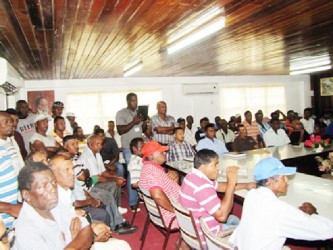Minister of Agriculture, Dr Leslie Ramsammy, yesterday said that while information is still being gathered, the first round of payments to rice farmers, from a $2.5 billion government advance began on Wednesday of last week.
He stated that Guyana will begin exporting its first shipment of rice to Venezuela after he returns from visiting Caracas and finalising the deal on May 16 and as such the government advance was necessary to pay rice farmers who were in critical need. The late signing of the annual rice agreement with Venezuela had caused a significant backlash; rice millers were unable to pay farmers due to the backlog of rice that was awaiting shipment.
Dr Ramsammy on Saturday during a meeting on the Essequibo Coast also established a team comprising industry experts that will tackle the various issues raised by farmers as they awaited the signing of the rice barter aspect of the PetroCaribe Agreement. The team was set up after farmers and the agriculture ministry held a town hall-style meeting in Anna Regina.
Dr Dindial Permaul who will head the team told Stabroek News that “this is going to be a neutral information gathering type of thing…we going to be looking at what’s happening on the ground”. Dr Permaul noted that farmers have various concerns and the current grading system used by millers to designate paddy prices was one of the most crucial. He said that “there is of course a current grading system and that is in place but the team is going to be going in and seeing if it is actually being followed,” he further said that there may be issues with executing the current system. Dr Permaul said that farmers have been frustrated for quite some time so the team will meet next week to work out a strategy. He stated that “this is a fairly experienced group of people and all familiar with the rice industry.”

Meanwhile farmers are interested to see what the team actually has to offer. Many farmers feel that the ministry has made promises in the past and there has been little follow through. Naithram, (only name), the Chairman of the recently formed Essequibo Paddy Farmers Association (EPFA) told Stabroek News that he will remain optimistic at this point however the “ministry has to accept that we are all waiting for things to come to fruition”. He said that “we asked for the grading system used by mills to be reviewed and on Saturday Ramsammy said he is going to make this team…they are to be set up next week and going to see what the mills are actually doing”. The EPFA Chairman stated that during the meeting he made it known to the agriculture ministry that many farmers have lost faith in the Guyana Rice Development Board (GRDB) and the Rice Producers Association (RPA). He said that “when Ramsammy came and talked to us we had to tell him that we want to be included in discussions.”
He said that the money being utilised as payments to farmers and how the ministry chose to handle the payout was one way for the government to showcase that they have been listening to farmers when they have raised concerns. “This money shouldn’t been going to the millers, it should be given directly to the farmers and not by the GRDB or the RPA but the ministry should be handling payments,” Naithram stated.
Paddy bug
Farmers told Stabroek News that they were anxious, too, to see if the ministry’s team of experts would move onto the paddy bug infestation. One farmer told Stabroek News that “I’m waiting to see if the grading team starts to look at the paddy bug problem and if they are going come and check the fields when we complain that the chemicals aren’t working”. He said that during the Saturday meeting famers were more interested in what the minister had to say as opposed to the GRDB and the RPA. “Ramsammy had to talk because he seemed like he didn’t know some of the things we are telling him like we are saying that no one checks the fields. They banned the monocrotophos, but we left with bad chemicals”.
Sham Narine, an Essequibo farmer stated that the banned chemical was dangerous, but the problem now is that “some of the rice stalks when you look long side the paddy doesn’t ripe at the same time”. He stated that the various strains of rice being developed by the GRDB have issues and the GRDB then needs to take responsibility for also helping farmers find proper pesticides.
During the meeting the agriculture ministry assured farmers that the only safe chemicals to use were registered with the Food and Drug/Government Analyst Department or the Pesticides and Toxic Chemicals Control Board. The minister noted that he will be requesting that the Pesticides Board publicise and distribute to farmers a comprehensive list of registered chemicals.
The Rice Factories Acts was also addressed with Dr Ramsammy promising to raise the issue of amendments to the act which would be beneficial to all stakeholders.





